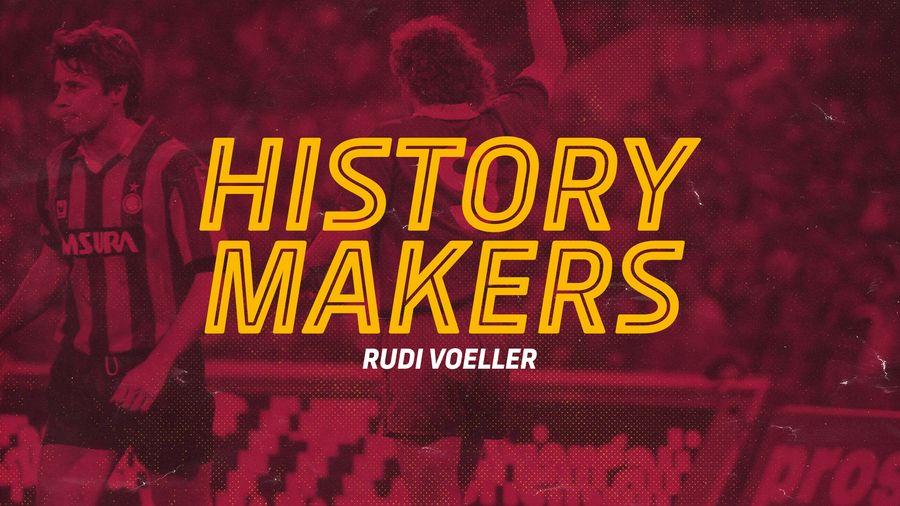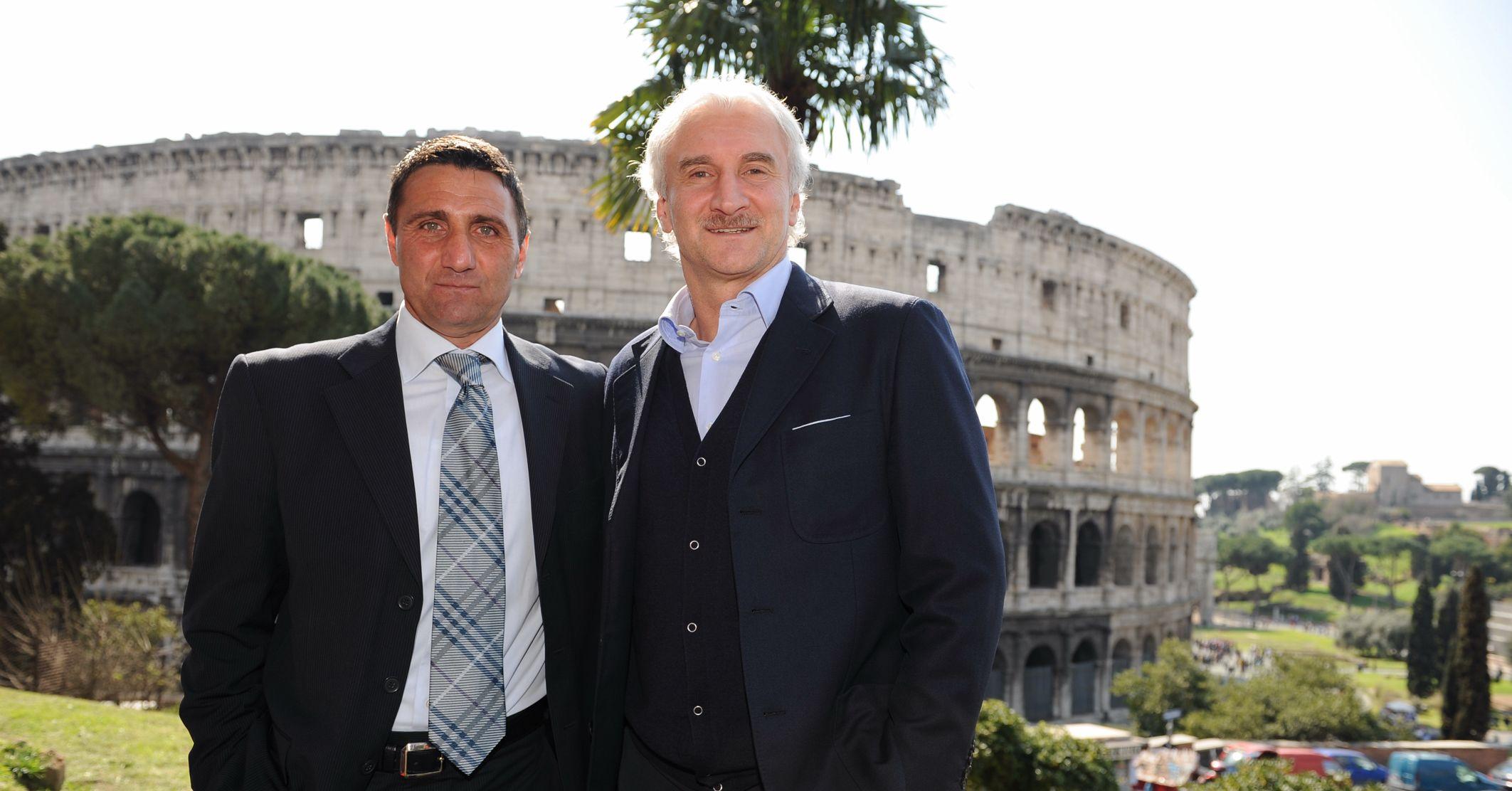

In the latest edition of our History Makers series, we remember Rudi Voeller; the Flying German that dazzled at the Stadio Olimpico from 1987-92 and a player that Daniele De Rossi listed as one of his “idols” growing up.
Voeller’s signature was one of the most sought after in European football when he agreed to join Roma ahead of the 1987-88 campaign and the Germany international would go on to endear himself to the Curva Sud like few non-Italians are able to.
His perm and moustache were unmistakable, so too his pace, unrelenting hard work and remarkable eye for goal.
Voeller (or Völler, depending on your preference) would go on to lift the Coppa Italia trophy and be crowned world champion in the city during his stay as a player in Rome, before later briefly returning as coach.
All told, he left such a mark that the Hanau native was later introduced to the club’s Hall of Fame.
RUDI VOELLER - IL TEDESCO VOLANTE
Born 13 April 1960 in the West German town of Hanau - a nudge east of Frankfurt - Voeller emerged through the youth ranks of hometown club TSV 1860 Hanau and then Offenbacher Kickers, where he made his professional debut in Germany’s second tier in 1977.
He made the step-up to the top tier of German football with 1860 Munich, before rattling 119 goals in 174 appearances with Werder Bremen to truly put his name on the map.
Voeller made the first of 90 appearances with Die Mannschaft in in 1982 and having been courted by some of European football’s biggest names, the Giallorosssi won the race for the then 27-year-old’s signature in 1987.
Having pursued Voeller for a number of years, legendary Roma coach Nils Liedholm finally got his man ahead of the new campaign - the first of his third spell in the Stadio Olimpico dugout - with his new signing keen to test himself “in the best league in the world”.
“In those days you only had Italy,” Voeller later told FourFourTwo.
“England was far away and Spain fell behind. All the players who wanted to achieve something, to make it big and to play in the best league of the world, came to Italy.”
Voeller arrived in Italy as the Bundesliga’s top scorer from the previous campaign but his first season was a frustrating one as injuries stunted his output in front of goal, where he managed just three league goals and a further two in the cup.
Roma did finish third that year though - their highest league position with Voeller in their ranks - and he improved to 15 goals in all competitions in his second season as the Roma faithful finally got to see his deadly poaching and trademark diving headers in action.
Things got better and better from there on out for Voeller, who by now had become a firm fan favourite, with the Curva Sud ringing out; “Vola tedesco vola, sotto la Curva vola, la Curva si innamora, tedesco vola.”
Or; “Fly German fly, under the Curva fly, the Curva falls in love, the German flies."
As a player, Voeller seemed to have everything, as described by Roma and Germany teammate Thomas Berthold - the man who jokingly dubbed his good friend Tante Kathe (‘Aunt Kathy’) due to his iconic grey perm.
“He was the complete striker,” Berthold told The Italian Football Podcast.
“He had complete skills. Header, right and left foot, keeping the ball very well, very fast… He is one of the best strikers ever in German football history.
“He was also a fantastic person. He was my roommate for 10 years for Germany and for Roma. We had a fantastic time together at Roma.”
The pair also lifted the World Cup with their national team at their club ground of the Olimpico in 1990, a moment that Voeller treasured - especially having won the penalty for Andreas Brehme to convert and down Diego Maradona’s Argentina in the city he now called home.
“For me it was like a dream come true. It was my third year in Rome and I played the World Cup final in ‘my’ stadium, it was almost a home game for us,” Voeller would go on to recall.
“It certainly helped that we had to play against Argentina. If the final had been Italy, it would have been more complicated.”
Voeller was instrumental to Roma’s cup success the following season as he scored 10 times in 12 appearances in his team’s run to the UEFA Cup final and four times in 10 matches as they lifted the Coppa Italia.
He scored penalties - both featuring his hallmark run-up from well outside the 18-yard box - in each leg of the Italian Cup final to power his team past Sampdoria and to the trophy, as his presence at the tip of the Roma attack continued to give them an extra edge.
“I'm lucky because Voeller is on my team,” said fellow Hall of Famer, Aldair.
“He's just so good, the best there is. I don't know if I'd be able to stop him.”
Voeller would eventually leave Roma for Marseille in the summer of 1992, with 68 goals in 198 appearances in all competitions. But the Flying German did so with a heavy heart.
“I’ll never forget my five years with the Giallorossi,” Voeller said years later.
“We won a Coppa Italia and in that stadium, my Stadio Olimpico, I was crowned as a world champion. Roma and the city of Rome will always have a special place in my heart."
Here are five of his best goals for the Giallorossi…
1. The trademark header..
vs. FIORENTINA (h)
11 June 1989
Serie A
With Roma chasing Fiorentina for a European spot, the Giallorossi closed the gap to La Viola to just two points with two games to play courtesy of a 2-1 comeback win secured by Voeller in the 87th minute.
As the ball broke in the Fiorentina box, Voeller hurled himself to meet it with a trademark diving header that sent everyone in yellow and red delirious.
2. The solo goal
vs. TORINO (a)
9 April 1989
Serie A
Voeller was known for scoring a variety of different goals, but the headers and clinical finishes in and around the box were a far more staple part of his diet than moments of individual brilliance.
This goal, however, was exactly that as the German picked the ball up on the left edge of the Torino box before dancing past four players and firing into the far corner.
3. The volley
vs. FIORENTINA (h)
9 September 1990
Serie A
The opening day of the 1990-91 season was a sign of things to come as Voeller scored a superb 17th minute opener in a 4-0 victory over Fiorentina.
Voeller’s technique was incredible as he watched the ball drop over his shoulder before unleashing a searing volley into the top corner.
4. The lob
vs. LECCE (h)
21 October 1990
Serie A
Rapid, two-footed and incredibly intelligent, Voeller was a master in rapidly making snap decisions when it came to goalscoring.
Here, he shows all of this in one fluid motion as Voeller breaks clear of the Lecce defence before spotting Giacomo Zunico racing of his line to meet the Roma man, who nonchalantly lifts the ball over the Lecce keeper with his left foot from 40-yards.
5. The one-two...
vs. CESENA (h)
11 November 1990
Serie A
The first of two very good Voeller goals that took Roma to a 4-1 win over Cesena as he exchanged a neat one-two on the edge of the box and rattled the return pass into the far top corner from the acutest of acute angles.
The second is another cracking left-footed strike from 25-yards, but even that can’t outdo his first.
What happened next for Voeller?
Voeller went on to become a French champion and Champions League winner in 1992-93, before hanging up his boots in 1996 with Bayer Leverkusen back in his homeland.
By then he had claimed 315 professional goals at club level and a further 46 in 90 games for his country.
A move into the backroom was immediate, with Voeller becoming sporting director at Leverkusen and eventually somewhat stumbling into the head coach roles with both Die Werkself and the German national team.
He would lead Germany to the World Cup final in 2002 - that they eventually lost to Brazil - making him one of only four people to both play and coach in the World Cup showpiece.
Voeller returned to the Olimpico as coach in 2004 after Cesare Prandelli’s unfortunate resignation, but the German would last just one month in the role before making way himself.
He has been a mainstay at Leverkusen, where he is still sporting director to this day, pretty much ever since and entered the Giallorossi Hall of Fame in 2014.
Voeller said at the time: “It’s a great honor to be part of this Hall of Fame and the history of this club, along with so many great players.
"Roma have always been a part of my life, so much so that in Germany I always say I’m half Roman rather than half Italian.”
Read more in this series:
Damiano Tommasi
Marco Delvecchio
Rodrigo Taddei
Vincent Candela
Pedro Manfredini
Alberto Aquilani
Hidetoshi Nakata
Cafu

 Tickets
Tickets
 Shop
Shop




































